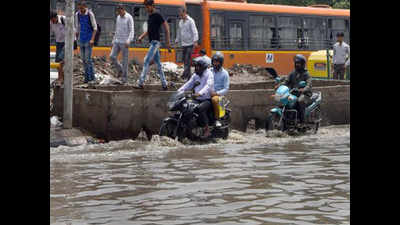- News
- City News
- delhi News
- Delhi HC: Appalled that single shower brings city to halt
Trending
This story is from July 17, 2018
Delhi HC: Appalled that single shower brings city to halt

File photo of rain in Delhi
NEW DELHI: Saying it was “appalled” that a single rain shower leads to hours of traffic jams and congestion “year after year”, the Delhi high court on Monday took note of recurring problem of waterlogging during monsoons.
A bench of acting Chief Justice Gita Mittal and Justice C Hari Shankar took suo motu note of media reports, including TOI articles, and demanded answers from AAP government, Centre and civic bodies on steps taken this year to prevent flooding.
“A single spell of rain results in severe traffic jams and waterlogging. It throws life out of gear. Incomprehensible why an action plan is not drawn up till now. The flooded underpass at Minto Bridge has become proverbial,” the bench observed, slamming the authorities for “not taking a macro view of the whole problem and there was only a knee-jerk reaction each time.”
HC underlined that the fallout of waterlogging is not only the loss of man-hours, with people unable to reach on time to their destinations, and emergency vehicles being left stranded, but the idling engines of vehicular traffic adds to the already severe air pollution in the city.
“While monsoons are beyond the control of the authorities, the problem of waterlogging is certainly within their control,” it said, asking chief secretary to convene an immediate meeting of senior officials of AAP government, its
The bench said the panel set up earlier to deal with problem of waterlogging must indicate the reasons despite the steps taken to prevent it and the “financial outlay” of the measures undertaken making it clear that authorities must also identify the spots where waterlogging occurs repeatedly, suggested remedial measures and the timeline for implementing them.
Meanwhile, DJB was asked to file a separate affidavit explaining the manner in which drainage of water takes place in Delhi, as well as the date of construction of various drains, including storm water drains, steps taken to maintain them and their efficacy. With the directions, the court listed the matter for further hearing on July 26, by when the panel’s report and the DJB affidavit has to be placed before the bench.
A bench of acting Chief Justice Gita Mittal and Justice C Hari Shankar took suo motu note of media reports, including TOI articles, and demanded answers from AAP government, Centre and civic bodies on steps taken this year to prevent flooding.
“A single spell of rain results in severe traffic jams and waterlogging. It throws life out of gear. Incomprehensible why an action plan is not drawn up till now. The flooded underpass at Minto Bridge has become proverbial,” the bench observed, slamming the authorities for “not taking a macro view of the whole problem and there was only a knee-jerk reaction each time.”
HC underlined that the fallout of waterlogging is not only the loss of man-hours, with people unable to reach on time to their destinations, and emergency vehicles being left stranded, but the idling engines of vehicular traffic adds to the already severe air pollution in the city.
The flooded roads and pavements would also lead to spread of waterborne and vectorborne diseases, the court noted, saying such congestion only “adds to the woes of the city.” It further observed that the situation shows “laxity” by the authorities.
“While monsoons are beyond the control of the authorities, the problem of waterlogging is certainly within their control,” it said, asking chief secretary to convene an immediate meeting of senior officials of AAP government, its
Public Works Department, the Centre, the three municipal corporations and DJB.
The bench said the panel set up earlier to deal with problem of waterlogging must indicate the reasons despite the steps taken to prevent it and the “financial outlay” of the measures undertaken making it clear that authorities must also identify the spots where waterlogging occurs repeatedly, suggested remedial measures and the timeline for implementing them.
Meanwhile, DJB was asked to file a separate affidavit explaining the manner in which drainage of water takes place in Delhi, as well as the date of construction of various drains, including storm water drains, steps taken to maintain them and their efficacy. With the directions, the court listed the matter for further hearing on July 26, by when the panel’s report and the DJB affidavit has to be placed before the bench.
End of Article
FOLLOW US ON SOCIAL MEDIA










